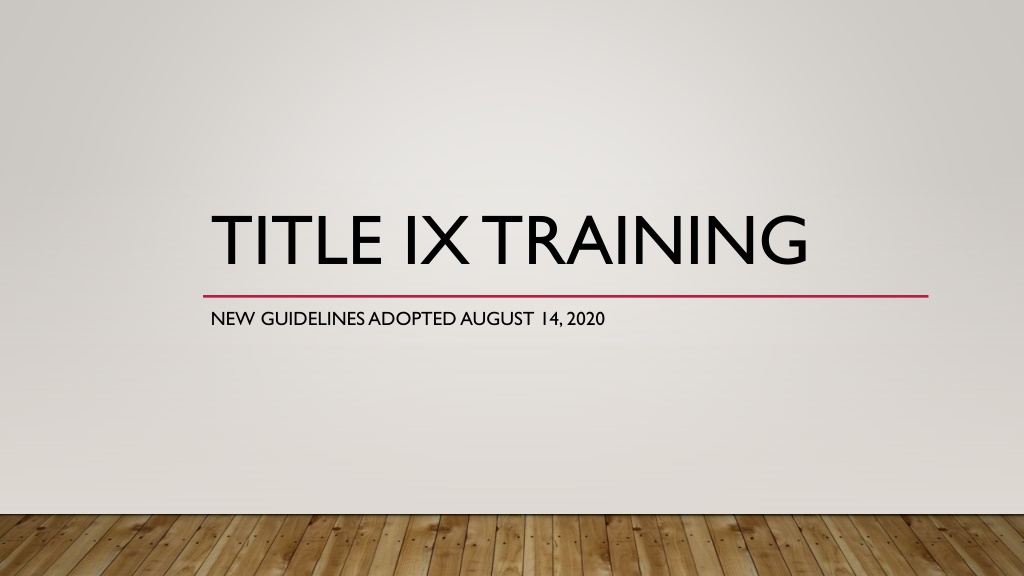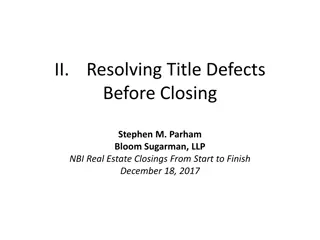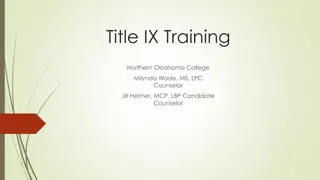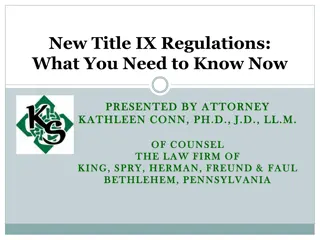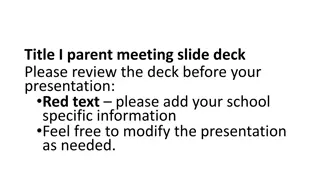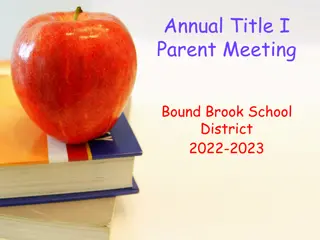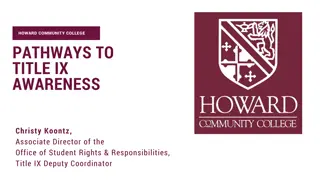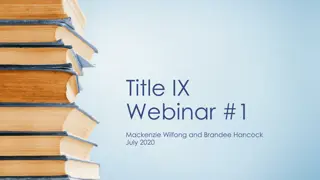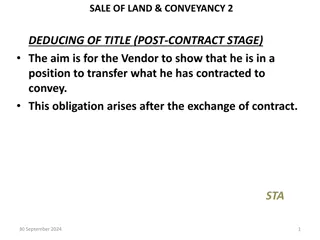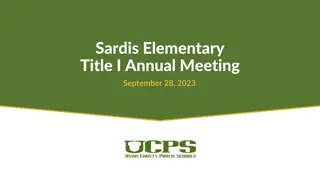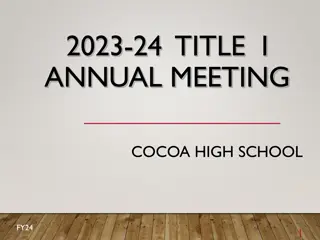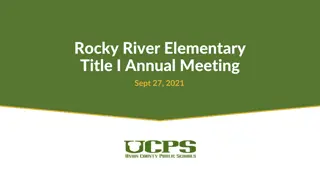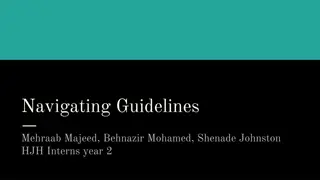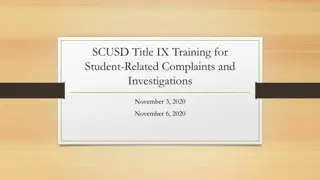Title IX Training Guidelines Updated!
Prohibited conducts include sex discrimination, sexual harassment, dating violence, and more within education programs or activities. Learn about the parties involved, processes, and reporting methods under Title IX regulations.
Download Presentation

Please find below an Image/Link to download the presentation.
The content on the website is provided AS IS for your information and personal use only. It may not be sold, licensed, or shared on other websites without obtaining consent from the author.If you encounter any issues during the download, it is possible that the publisher has removed the file from their server.
You are allowed to download the files provided on this website for personal or commercial use, subject to the condition that they are used lawfully. All files are the property of their respective owners.
The content on the website is provided AS IS for your information and personal use only. It may not be sold, licensed, or shared on other websites without obtaining consent from the author.
E N D
Presentation Transcript
TITLE IX TRAINING NEW GUIDELINES ADOPTED AUGUST 14, 2020
WHAT CONDUCT IS PROHIBITED IN ACCORDANCE WITH TITLE IX? Sex Discrimination Sexual Harassment (irrespective of gender identity or sexual orientation) Dating violence Gender-based harassment Sexual assault Domestic violence Stalking So long as any of the above occurred within an education program or activity. Those Who Have Been Retaliated Against or Reported, Testified, Assisted or Participated in an Investigation, Proceeding, or Hearing under this policy
WHAT IS WITHIN AN EDUCATION PROGRAM OR ACTIVITY? Includes the following: Locations Events Circumstances over which the College exercises substantial control over both the Respondent and the context in which the sexual harassment occurs, and includes any building owned or controlled by a student organization officially recognized by the College.
WHO ARE PARTIES TO A TITLE IX PROCEEDING? Complainant- Individual who is alleged to be the victim of conduct that could constitute Sexual Harassment. Respondent-An individual who has been reported to be the perpetrator of conduct that could constitute sexual harassment.
TITLE IX PROCESSES Formal Complaint-A document filed by a Complainant or signed by the Title IX Coordinator alleging sexual harassment against a Respondent and requesting that the College investigate the allegation of sexual harassment. Ways to file Complaint with Title IX Coordinator: In person By mail By email Using Incident Reporting Form available on Wolf Den The document filed means a document or electronic submission that contains the Complainant s physical or digital signature or that otherwise indicates the Complainant is the person filing the formal complaint.
TITLE IX PROCESSES (CONT.) Reports regarding sex discrimination can also be made by any person whether or not the person is alleged to be the victim via mail, in person, telephone, electronic mail or by any other means that results in Title IX Coordinator receiving the person s verbal or written report. Any person may report sexual harassment (whether or not the person reporting is the person alleged to be the victim of conduct that could constitute sex discrimination or sexual harassment) to a Responsible Employee via methods outlined above to the Title IX Coordinator.
TITLE IX PROCESSES (CONT.) Upon receiving a report of sexual harassment, the Title IX Coordinator shall: Contact the Complainant to discuss availability of Supportive Measures; Consider the Complainant s wishes with respect to Supportive Measures; Inform the Complainant of the availability of Supportive Measures with or without the filing of a formal complaint; Explain the process of the filing of a formal complaint; and Confirm the Method and Manner in which the Parties involved desire to receive official notices and information for the duration of proceedings related to a report under this policy (mail, personal delivery - on campus only, or certified mail)
TITLE IX PROCESSES (CONT.) College s Duties: In cases of sexual harassment, the College will keep Complainant s identity confidential (including from Respondent) unless supportive measures require disclosure (no-contact order) Individuals are encouraged to report sexual misconduct that may also violate criminal law to the College and local law enforcement as the processes are mutually exclusive When a formal complaint is processed, the Complainant cannot remain anonymous or have their identity not disclosed to Respondent. Upon a formal complaint, the Title IX Coordinator makes contact with Complainant and discusses supportive measures available and considers the Complainant s wishes with respect to Supportive Measures. Determine if a Respondent needs to be removed from the student s educational program on an emergency basis
TITLE IX PROCESSES (CONT.) Upon initial review of the formal complaint, the coordinator must determine if the Formal Complaint is to be dismissed on a required or permissive basis. If the Title IX Coordinator determines to dismiss the Formal Complaint, the Title IX Coordinator shall communicate the determination along with the reason(s) therefore via a Notice of Dismissal to the parties simultaneously in writing within in 10 college business days. Should a Notice of Dismissal be issued, the parties shall have an opportunity to appeal the dismissal by submitting a written notice of Appeal of Dismissal (Procedures are on p. 10 of policy). The Title IX Coordinator will submit the Appeals of Dismissal to the Dean of Students for consideration. Will provide the parties a written decision including the reason therefore within 10 days of receipt of any Appeal(s) of Dismissal
TITLE IX PROCESSES (CONT.) Consolidation is when Formal Complaints are consolidated as to allegations of sexual harassment against more than one Respondent or by more than one Complainant against one or more Respondents, or by one Party against the other Party where the allegations of sexual harassment arise out of the same facts or circumstances. Continuing Review-There is continuing review throughout the process in determining if the Formal Complaint is required to be dismissed or may be dismissed. If the Formal Complaint is being dismissed and had been consolidated with allegations of sexual or other misconduct may continue to be investigated and/or adjudicated in accordance with applicable college policies which shall be indicated in the Notice of Dismissal
TITLE IX PROCESSES (CONT.) NOTICE OF ALLEGATIONS Notice of Allegations-Within 3 days after determining that the Formal Complaint is not subject to dismissal and shall proceed, or, in the event a Party appeals dismissal, within 3 days of the issuance of a decision affirming the appeal dismissal, the Title IX Coordinator shall provide written Notice of the Allegations to the parties who are known
TITLE IX PROCESS (CONT.) NOTICE OF ALLEGATIONS The Notice of Allegations requires the following: Notice of College s grievance process, including its informal resolution process, under this Policy; Notice of allegations of sexual harassment potentially constituting Sexual Harassment, including sufficient details known at the time and with sufficient time to prepare a response before any initial interview; Sufficient details include the identities of the Parties involved in the incident, if known, the conduct allegedly constituting sexual harassment, and the date and location of the alleged incident, if known
TITLE IX PROCESS (CONT.) NOTICE OF ALLEGATIONS The Notice of Allegations requires the following: A statement that the Respondent is presumed not responsible for the alleged conduct and that a determination regarding responsibility is made at the conclusion of the grievance process; A statement informing the Parties that they may have an advisor of their choice, who may be, but is not required to be, an attorney, who may accompany them to any related meeting or grievance proceeding. The statement shall explain that the College shall not limit the choice or presence of advisor for either the Complainant or Respondent in any meeting or grievance proceeding
TITLE IX PROCESS (CONT.) NOTICE OF ALLEGATIONS Notice of Allegations requires the following (cont.): A list of the names and titles of available advisors from which to choose, and a statement that the Parties must notify the Title IX Coordinator of their choice of advisor within 10 days of the Written Notice; A statement informing the Parties that they may inspect and review evidence obtained as part of the investigation that is directly related to the allegations raised in a Formal Complaint, including the evidence upon which the investigator(s) does not intend to rely in reaching a determination regarding responsibility, and including inculpatory or exculpatory evidence whether obtained from a Party or other source A statement informing the Parties of that the College s Student Code of Conduct and Anti- Harassment Policy prohibit knowingly making false statements or knowingly submitting false information during the grievance process.
TITLE IX PROCESS (CONT.) CONSOLIDATION If 2 or more Formal Complaints have been consolidated, the Notice of Allegations must advise the Parties of such consolidation with other formal complaint(s). Amending the Notice of Allegations may arise if during the investigation new details emerge that warrant additional allegations or charges. If this, occurs the Title IX coordinator must send a Revised Notice of Allegations to the Parties.
TITLE IX PROCESS (CONT.) ADVISORS Parties are entitled to an advisor of their choice, who may be, but is not required to be an Attorney. Advisors are required to be: Professionals-Attorneys or experienced advocates Adults, capable of understanding the purpose and scope of cross-examination The College maintains a list of advisors available to a party at no extra cost (attorneys are not provided and are at the expense of the party) Within 10 days of the Written Notice of Allegations, each party must submit a written notification of advisor selection via the Advisor Selection Notice to the Title IX Coordinator. The Title IX Coordinator must confirm advisor for each student within 12 days
TITLE IX PROCESSES (CONT.) INVESTIGATIONS The investigator shall complete the investigation within 30 days of the referral and prepare an investigative report that fairly summarizes relevant evidence within 45 days of the referral (timeframe can be extended for good cause). The burden of gathering evidence sufficient to reach a determination regarding responsibility rests on the investigator and not on the Parties. However parties may still identify fact and expert witnesses and present other evidence and are not restricted from discussing the allegations under investigation or gather and present relevant evidence.
TITLE IX PROCESSES (CONT.) INVESTIGATIONS The investigator shall interview the parties and witnesses. The investigator shall provide at least five days written notice to a Party or witness whose participation is invited or expected, including the date, time, location, participants, and purpose of all investigative interviews or other meetings or proceedings The investigator cannot access, consider, disclose, or otherwise use a Party's records that are made or maintained by a physician, psychiatrist, psychologist, or other recognized professional or paraprofessional acting in the professional's or paraprofessional's capacity, or assisting in that capacity, and which are made and maintained in connection with the provision of treatment to the Party, unless the investigator obtains that Party's voluntary, written consent.
TITLE IX PROCESSES (CONT.) INVESTIGATIONS The investigator shall concomitantly send the investigative report, including all relevant evidence, to the Title IX Coordinator. The Parties will have 5 days to submit any written response to the Title IX Coordinator. The report may include credibility findings, but shall not make a determination regarding responsibility (report must redact nonrelevant information from the investigative report) At least 10 days prior to the hearing, the investigator shall send to each Party and the Party's advisor, if any, the investigative report, including all relevant evidence, in an electronic format or a hard copy, for their review and written response (if desired).
TITLE IX PROCESS THE INTERVIEW The Parties shall have the opportunity to be accompanied by their advisor in any investigative interview or other meeting or proceeding under this Policy; Advisors may not speak or participate during an investigative interview. A Party may take breaks in order to consult with their advisor. Upon approval of the College, a Party may have another person (other than the advisor) to attend an investigative interview or other meeting or proceeding under this Policy. No Party shall have the right to attend, or have their advisor attend, an investigative interview of another Party or witness.
TITLE IX PROCESS INSPECTION AND REVIEW OF EVIDENCE The investigator shall provide the Parties an equal opportunity to inspect and review any evidence obtained as part of the investigation that is directly related to the allegations raised in a Formal Complaint and inculpatory or exculpatory evidence whether obtained from a Party or other source, so that each Party can meaningfully respond to the evidence prior to conclusion of the investigation.
TITLE IX PROCESS INSPECTION AND REVIEW OF EVIDENCE Prior to completion of the investigative report, the investigator shall send to each Party and the Party's advisor, if any, the evidence subject to inspection and review in an electronic format or a hard copy. Neither the Parties nor their advisors shall be permitted to disclose or disseminate the evidence to any person who is not a Party or witness or other participant in the Grievance Process
TITLE IX PROCESS INSPECTION AND REVIEW OF EVIDENCE Before sending such evidence to the Parties for inspection and review, the investigator shall redact from such evidence any information that is not directly related to the allegations (or that is otherwise barred from use any provision of this Policy, such as information protected by a legally recognized privilege, or a Party s treatment records if the Party has not given written consent). The Parties shall have 10 days to submit a written response, which the investigator will consider prior to completion of the investigative report.
TITLE IX PROCESS PRE- HEARING A live hearing will be scheduled to take place no less than 10 days and no more than 30 days after the investigator sends the investigative report to each Party and the Party s advisor, if any. The Title IX Coordinator shall send the investigative report along with the relevant evidence to the Hearing Panel, and any timely received written response to the investigator, at least 5 days prior to the hearing. No less than 10 days before the hearing, the Title IX Coordinator shall notify all Parties and Witnesses of the date, time and place of the hearing, or if the hearing is virtual, the access instructions. The notice shall request each Party and Witness to confirm their attendance in writing to the Title IX Coordinator no less than 7 days before the hearing.
TITLE IX PROCESS PRE-HEARING No less than five days prior to the hearing, the Parties shall each submit a pre-hearing submission ( Pre-Hearing Submission ) to the Title IX Coordinator, to be disseminated to the hearing panel ( Hearing Panel ) and shall include: A written statement as to whether the Party intends to bring an advisor of choice to the hearing, and if so, the name and contact information of such advisor; The Party s written response, if any, to the investigator s report; Any objections to the relevancy of any evidence; and Whether the Party intends to make opening and closing statements.
TITLE IX PROCESS PRE-HEARING All questions regarding hearing procedures shall be directed to the Title IX Coordinator in writing. The Title IX Coordinator shall endeavor to respond as promptly as possible, in most cases within 2 days. The questions and the Title IX Coordinator s response will be provided to both Parties and their advisors
TITLE IX PROCESS HEARING Hearing Panel Empaneled five decision-makers composed of faculty and staff. Neither the Title IX Coordinator, the investigator nor a Party s advisor shall serve as a decision-maker Hearing Officer The decision-makers shall appoint one decision-maker to also serve as the hearing officer ( Hearing Officer ). The Hearing Officer shall oversee the hearing in accordance with this Policy.
TITLE IX PROCESS HEARING Virtual and Live Hearings Live hearings may be conducted with all Parties physically present in the same geographic location Virtually with any or all of the Parties, witnesses and other participants located in separate rooms or geographical locations with technology enabling the decision-makers and participants to simultaneously see and hear each other. Any Party or advisor requiring any accommodations for the hearing should notify the Title IX Coordinator within 5 days of receiving the Notice of the Hearing.
TITLE IX PROCESS HEARING RECORDING The College shall create an audio or audiovisual recording, or transcript, of all hearings and make it available to the Parties for inspection and review. The entire hearing must be recorded, including but not limited to cross-examination, opening and closing remarks, questions for the Hearing Panel, procedural discussions, objections and relevancy determinations, scheduling questions and the like. The Parties shall have an equal opportunity to inspect and review the recording or transcript of the hearing, however the College is not obligated to send the Parties a copy of the recording or transcript
TITLE IX PROCESS WITNESS EXAMINATION If a Party does not have an Advisor present at the live hearing, the College must provide without fee or charge to that Party, an advisor of the College s choice, who may be, but is not required to be, an attorney, to conduct cross-examination on behalf of that Party. Advisors participation in hearings is generally limited to cross-examination of the other Party and witnesses, including questions challenging credibility. At the conclusion of each Party s or witnesses testimony, the Hearing Officer will ask each Party if their advisor has any additional questions for the Party witness. At that time, advisors may request that the Hearing Officer ask additional questions.
TITLE IX PROCESS WITNESS EXAMINATION Cross-Examination Only relevant cross-examination and other questions may be asked of a Party or witness. The Hearing Panel must permit each Party's advisor to ask the other Party and any witnesses all relevant questions and follow-up questions, including those challenging credibility. Such cross-examination must be conducted directly, orally, and in real time by the Party's Advisor of choice and never by a Party personally.
TITLE IX PROCESS RELEVANCY The Hearing Officer will make real-time relevancy determinations related to each question asked prior to a witness or Party answering the question. Where questioning or evidence is duplicative, the Hearing Panel may deem the questioning or evidence not relevant. Information protected by a legally-recognized privilege is not relevant. Questions and evidence about the Complainant's sexual predisposition are not relevant. Questions and evidence about the Complainant s prior sexual behavior are not relevant except: (i) when offered to prove that someone other than the Respondent committed the conduct alleged by the Complainant; or (ii) when specific incidents of the Complainant's prior sexual behavior with respect to the Respondent are offered to prove Consent
TRIAL PROCESS RELEVANCY (CONT.) The determination of relevancy is the cornerstone of evidence admissibility. Relevancy is any material fact or information which tends to make the existence of any fact that is of consequence to the determination of the action more probable or less probable than it would be without the evidence.
TRIAL PROCESS RELEVANCY (CONT.) Before a Complainant, Respondent, or Witness answers a cross-examination or other question posed by an Advisor or a member of the Hearing Panel, the Hearing Officer shall determine whether the question is relevant and explain any decision to exclude a question as not relevant. In order to determine relevancy, the Hearing Panel may ask the advisor the reason the advisor seeks such evidence. The Hearing Panel s decision is not subject to further challenge at that time and the hearing shall proceed in an orderly fashion. However, the Hearing Panel may send to the Parties after the hearing any revisions to its explanation of a relevance decision that was provided during the hearing
TITLE IX PROCESS PARTY OR WITNESS NOT COMPELLED TO TESTIFY If a Party or witness does not submit to cross-examination at the hearing, the decisionmakers must not rely on any statement of that Party or witness in reaching a determination regarding responsibility; The decision-makers cannot draw an inference about the determination regarding responsibility based solely on a Party's or witness's absence from the live hearing or refusal to answer cross-examination or other questions. This provision does not preclude the decision-makers from reviewing evidence that may involve the Party or witness who refused to submit to cross-examination.
TITLE IX PROCESS STANDARD OF EVIDENCE In weighing evidence, the Hearing Panel must apply the Preponderance of Evidence Standard. Preponderance of Evidence is the burden of proof applied to the exculpatory and inculpatory evidence presented in the hearings and is best defined as more likely than not responsible. Exculpatory evidence- evidence favorable to the respondent Inculpatory evidence- evidence that shows or tends to show a respondent s involvement in an act
TITLE IX PROCESS WRITTEN DECISION Within 10 days of the conclusion of the hearing, the Panel shall simultaneously send a written determination letter ( Written Determination ) to the Parties, which shall include: Identification of the allegations potentially constituting Sexual Harassment as defined in this Policy; A description of the procedural steps taken from the receipt of the Formal Complaint through the Hearing Panel s determination, including any notifications to the Parties, interviews with Parties and witnesses, site visits, methods used to gather other evidence, and hearing dates held; Findings of fact supporting the Hearing Panel s determination; Conclusions regarding the application of this Policy to the facts; A statement of, and rationale for, the result as to each allegation, including a determination regarding responsibility, any disciplinary sanctions the Hearing Panel determines to impose on the Respondent, and whether Supportive Measures will be provided for the Complainant; and The College s procedures and permissible bases for the Complainant and Respondent to appeal.
TITLE IX PROCESSES SANCTIONS The following disciplinary sanctions may be imposed upon a student responsible for a violation of this Policy, either singly and/or in combination: Expulsion Suspension Residence Hall Separation Disciplinary Probation
TITLE IX PROCESSES SANCTIONS Disciplinary sanctions cont. : Conduct Probation Conduct Warning No Contact Order Educational Sanctions Transcript Notation
TITLE IX PROCESSES SANCTIONS IF RESPONDENT IS AN EMPLOYEE The disciplinary sanctions that may be imposed upon an employee found to be responsible for a violation of this Policy, either singly and/or in combination: warning; disciplinary probation; reassignment or transfer, remedial measures such as trainings and educational programs; and/or termination. Where the Hearing Panel determines that a tenured faculty member is to be terminated, the case must then proceed through the procedures for termination of tenure specified in the Faculty Policies Manual.
TITLE IX PROCESS APPEALS A Party may appeal the Hearing Panel s decision on the following grounds: Procedural irregularity (i.e. an error or mistake in the way the investigation or hearing) that affected the outcome of the matter; New evidence that was not reasonably available at the time the determination regarding responsibility was made, that could affect the outcome of the matter; The Title IX Coordinator, investigator(s), or decision-maker(s) had a conflict of interest or bias for or against complainants or respondents generally or the individual Complainant or Respondent that affected the outcome of the matter; and/or; The sanctions assessed are substantially disproportionate to the findings. The disciplinary sanction will remain in place during the appeal process.
TITLE IX PROCESS APPELLATE PROCESS Within three days of receiving any Appeal(s) of Determination, The Title IX Coordinator will conduct an initial review to determine if the appeal request meets the limited grounds and is timely. If the appeal is not timely or substantively eligible, the original finding and sanction will stand and the decision is final, and the Parties shall be notified in writing.
TITLE IX PROCESS APPELLATE PROCESS If the appeal has standing, the Title IX Coordinator shall notify all other Parties in writing and provide them with 5-day to submit a written statement in support of, or challenging, the determination. After the 5-day period, the Title IX Coordinator will submit the Appeal(s) of Determination, and any additional written statements in support of, or challenging, the determination, to the Appellate Panel for consideration. The Appellate Panel shall consist of three Campus Disciplinary Board members not previously involved in the case who are appointed by the Assistant Dean of Students
TITLE IX PROCESS INFORMAL RESOLUTION Where the facts alleged in a Formal Complaint are not contested, or where the Respondent(s) has admitted, or wishes to admit responsibility, or where the Parties want to resolve a case without a completed investigation or adjudication, informal resolution may be an appropriate solution. Informal resolution may include, but is not limited to, mediation and conciliation, and various forms of restorative justice, to be determined within the discretion of the Title IX coordinator.
TITLE IX PROCESS INFORMAL RESOLUTION An informal resolution process may be available at any time: After a Formal Complaint has been filed and is not dismissed pursuant to Section IV-A of this Policy; After a Notice of Allegations has been issued to the Parties; and (3) prior to the Hearing Panel reaching a determination regarding responsibility. The Title IX Coordinator may choose to offer the Parties an informal resolution process. Alternatively, any Party may submit a written request to the Title IX Coordinator for an informal resolution process. The decision as to whether to offer or grant a request to engage an informal resolution process resides within the sole discretion of the Title IX Coordinator.
TITLE IX PROCESS INFORMAL RESOLUTION An informal resolution process may be available at any time (cont.): An informal resolution process may take place, if deemed appropriate by the Title IX Coordinator, where only some Parties to a Formal Complaint (or consolidated Formal Complaints) seek to participate. In such a case, adjudication of the Formal Complaint (or consolidated Formal Complaints) shall continue as between the Parties who do not participate in the informal resolution process. Notwithstanding, an informal resolution process is never available to resolve: (i) allegations that an employee sexually harassed a student; (ii) allegations of sexual assault.
TITLE IX PROCESS NOTICE OF INFORMAL RESOLUTION When the Parties have indicated to the Title IX Coordinator their assent to engage in an informal resolution process, the Title IX Coordinator shall provide the Parties with a written notice of information resolution which shall include: (i) a statement of the allegations; (ii) a statement that no Party is required to participate in an informal resolution process; (iii) a statement that any Party may withdraw from the informal resolution process and resume the grievance process with regard to a Formal Complaint arising from the same allegations at any time prior to signing a resolution agreement; (iv) a statement that the Parties are required to keep all information and communications relating to the informal resolution process confidential both during and after the informal resolution process
TITLE IX PROCESS NOTICE OF INFORMAL RESOLUTION a statement that any statements or admissions disclosed during the informal resolution process shall remain confidential and shall not be used in a subsequent investigation or proceeding arising out of the same or any other Formal Complaint; a statement that records relating to the informal resolution process will be maintained by the Title IX Coordinator and may be shared or disclosed in accordance with this Policy, FERPA and/or applicable federal or state law; a statement that notwithstanding the confidentiality requirements of the informational resolution process, should the informal resolution process fail to satisfactorily resolve the matter, or if any Party withdraws from the informal resolution process, no Party shall be restricted in their ability to discuss the allegations under investigation or to gather and present relevant evidence after the matter is referred back to the Title IX Coordinator for investigation and/or adjudication under this Policy; a statement that all Parties must provide their voluntary, written consent to engage in to the informal resolution process to the Title IX Coordinator; (ix) a statement that a record of the outcome, including a resolution agreement, if any, will be maintained by theTitle IX Coordinator; and a statement that should the informal resolution process fail to satisfactorily resolve the matter, or if any Party withdraws from the informal resolution process, the matter shall be promptly referred back to the Title IX Coordinator for investigation and/or adjudication under this Policy.
TITLE IX PROCESS INFORMAL RESOLUTION FACILITATOR Upon receipt of each Party s voluntary written consent to participate in an informal resolution process, the Title IX Coordinator shall refer the matter to an informal resolution facilitator. The informal resolution facilitator shall promptly contact the Parties in writing to commence the informal resolution process, which may occur in person and/or virtually. Advisors are not permitted to participate in an informal resolution process. Should the informal resolution not resolve the matter, the informal resolution facilitator is not permitted to be called as a witness in a related investigation or hearing.
TITLE IX PROCESS CONFIDENTIALITY The College must keep confidential the identity of Complainants, Respondents and witnesses, except as may be permitted by FERPA, as required by applicable law or as necessary to carry out a proceeding under this Policy. Access to Records- Parties may request access to records under this Policy by submitting such request in writing to the Title IX Coordinator who shall respond within 25 days. The Title IX Coordinator shall assess the request in light of FERPA and any other applicable federal and/or state laws. Records may be provided via an opportunity to review and inspect.
